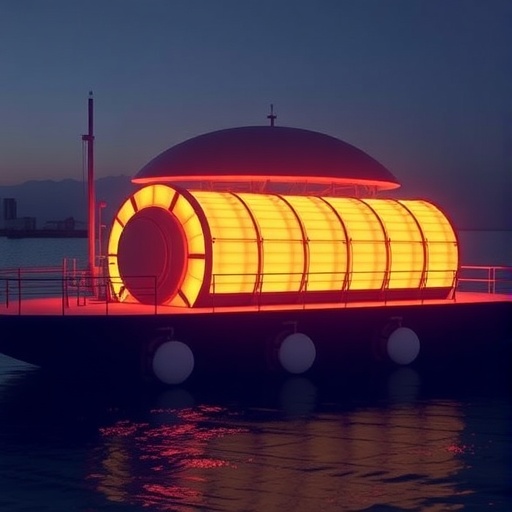In a groundbreaking advancement that could redefine the landscape of renewable energy, researchers have unveiled a novel thermomagnetic generator designed specifically for harvesting ultra-low-grade marine thermal energy. This pioneering technology taps into the subtle temperature gradients found in ocean waters, presenting a revolutionary solution to the persistent challenge of efficient energy extraction from marine environments. By harnessing thermomagnetic effects, the system promises a new era of clean energy generation that could significantly contribute to global sustainable development goals and energy security.
The oceans cover more than 70% of the Earth’s surface and store vast amounts of thermal energy, yet much of this resource remains untapped, especially at low temperature differentials. Traditional energy harvesting methods often struggle with efficiency when dealing with such minimal thermal gradients. Addressing this issue, the newly developed thermomagnetic generator exploits magnetic entropy changes in specific materials when subjected to temperature fluctuations, enabling conversion of minimal thermal energy into usable electrical power with unprecedented effectiveness.
At the core of this innovative approach lies the magnetocaloric effect—a phenomenon where certain materials heat up or cool down under changes in magnetic fields. By integrating this effect with precise thermomagnetic cycles, the researchers have engineered a generator capable of operating within ultra-low temperature ranges, typical of marine environments where thermal gradients are often as subtle as a few degrees Celsius. This makes it possible to harvest energy from ocean waters without interfering with marine ecosystems or relying on external, high-temperature heat sources.
The design centers around the strategic use of magnetocaloric materials such as gadolinium alloys, which display strong thermomagnetic responses at temperatures that closely match oceanic conditions. These materials undergo cyclic magnetization and demagnetization, thus generating temperature variations that can be transformed into electrical power through innovative coupling mechanisms. This process not only optimizes energy conversion efficiency but also minimizes energy losses traditionally associated with low-grade heat sources.
To realize this concept, the research team embarked on comprehensive material characterizations and device prototyping. Employing advanced thermal management techniques, including heat exchangers optimized for the marine environment, they successfully demonstrated a working prototype that reliably converted ambient underwater thermal gradients into steady electrical output. The prototype’s performance metrics reveal a promising power density and stability over extended periods, indicating strong potential for real-world applications.
Notably, the thermomagnetic generator’s footprint and modular nature make it highly adaptable, allowing deployment across diverse marine settings such as deep-sea buoys, offshore platforms, and autonomous underwater vehicles. Unlike conventional ocean thermal energy conversion (OTEC) systems, which require large temperature differences and extensive infrastructure, this system’s efficiency at low-grade thermal reservoirs vastly expands feasible locations for harnessing ocean energy.
Furthermore, the technology’s intrinsic scalability opens avenues for integrating multiple units to form clusters or networks capable of generating significant amounts of renewable electricity. When combined with energy storage solutions, such arrays could support continuous power supply for remote coastal communities or marine research stations, thereby enhancing energy independence and reducing reliance on fossil fuels in these often-isolated environments.
Another compelling feature is the generator’s environmentally benign operation. Since it leverages naturally occurring ocean temperature differentials without combustion or chemical reactions, it presents minimal ecological impact. The absence of moving mechanical parts in some configurations also means reduced maintenance and longer operational lifetimes, key factors for offshore energy systems challenged by harsh marine conditions.
The implications of this research reach beyond marine energy harvesting. The principles and materials employed can be adapted to extract energy from other low-grade thermal environments, including industrial waste heat recovery and geothermal sources, potentially revolutionizing how industries approach energy efficiency and sustainability. By providing a versatile technology platform, the thermomagnetic generator concept heralds a broader shift in energy harvesting paradigms.
Looking ahead, the research team emphasizes continued optimization of magnetocaloric materials to enhance thermomagnetic responsiveness and thermal conductivity. Innovations in nanostructuring and composite materials are under exploration to further boost performance. Simultaneously, advanced control systems are being developed to synchronize magnetization cycles precisely, maximizing power conversion under dynamically changing marine conditions.
Policy and economic considerations might also facilitate the adoption of this technology. With increasing global attention on climate change and ocean conservation, thermomagnetic generators offer a compelling nexus of technological innovation and environmental stewardship. Strategic partnerships with renewable energy stakeholders and marine technology developers can accelerate testing, standardization, and commercialization, fostering new green energy markets.
As the energy landscape intensifies its pivot towards sustainability, breakthroughs in marine thermal energy harvesting hold great promise. The demonstrated viability of thermomagnetic generators as efficient converters of ultra-low-grade ocean heat not only addresses gaps left by conventional methods but also inspires fresh explorations into magnetically driven energy technologies. This fusion of physics, materials science, and environmental engineering exemplifies the forward-thinking ingenuity required to meet future energy demands.
In sum, the reported thermomagnetic generator embodies a transformative approach to harvesting ocean thermal energy, leveraging subtle temperature differences with magnetic phenomena to produce clean, reliable electricity. Its deployment could unlock vast dormant energy reserves, contributing significantly to reducing carbon footprints while paving the way for innovative renewable technologies adaptable far beyond the oceans. This landmark study signals a pivotal step towards a resilient and sustainable energy infrastructure powered by the planet’s own marine heartbeat.
Subject of Research: Thermomagnetic generators for ultra-low-grade marine thermal energy harvesting
Article Title: Thermomagnetic generators for ultra-low-grade marine thermal energy harvesting
Article References:
Moreno Resendiz, E., Peterson, T. & Kishore, R.A. Thermomagnetic generators for ultra-low-grade marine thermal energy harvesting. Commun Eng 4, 204 (2025). https://doi.org/10.1038/s44172-025-00542-y
Image Credits: AI Generated
DOI: https://doi.org/10.1038/s44172-025-00542-y
Tags: clean energy generation solutionsenergy efficiency in marine environmentsinnovative energy extraction methodsmagnetic entropy changes in materialsmagnetocaloric effect in energy conversionmarine thermal energy harvestingocean thermal energy potentialrenewable energy technologysustainable development goals in energythermomagnetic cycles for power generationthermomagnetic generatorsultra-low-grade thermal energy





